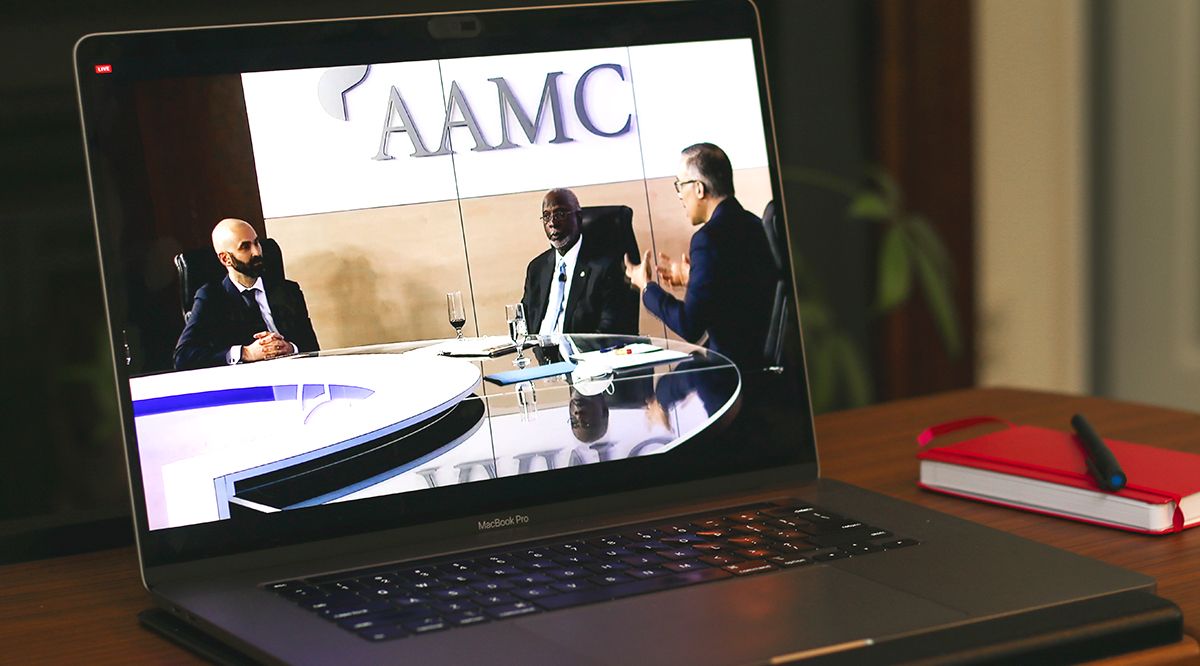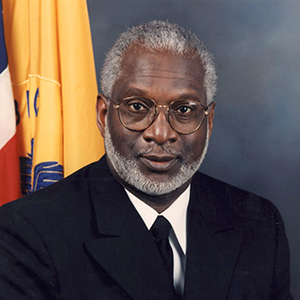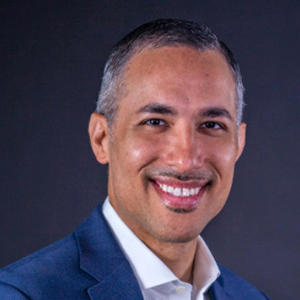
While COVID-19 laid bare entrenched health inequities, the United States has also recently witnessed significant progress in increasing awareness of racial and health justice, two esteemed health equity leaders told attendees at Learn Serve Lead 2021: The Virtual Experience on Nov. 8.
At the session titled “Health Equity After COVID-19,” former U.S. Surgeon General David Satcher, MD, PhD, and health policy expert Daniel Dawes, JD, also warned that any progress could be undermined by racism, political resistance, and institutional inertia.
“Today we see almost 250 cities, counties, and leaders declaring racism to be a public health issue, a public health crisis. I think that’s really bold,” said Dawes. Still, we have to remain vigilant about such key concerns as implementation of the infrastructure bill just passed by Congress, he told the session’s moderator, Philip Alberti, PhD, founding director of the new AAMC Center for Health Justice.
“As we implement this at the state and local levels, we need to take an equity lens to understand how it will affect these most vulnerable, minoritized communities … not only people of color, but people with disabilities, for instance.” If we don’t take an equity lens, he cautioned, “we’re going to repeat history again.”
That history includes the factors that fuel disparities in heart disease and other conditions and that sparked dramatic inequities during the pandemic, noted Satcher, founder of the equity-focused Satcher Health Leadership Institute at Morehouse School of Medicine in Atlanta.
What’s more, history shows that social determinants of health — access to nutritious food, clean air, safe streets, and more — all flow from upstream factors in the worlds of policy and politics, argued Dawes, echoing points made in his 2020 book, The Political Determinants of Health.
If historically disempowered groups are going to affect those political determinants, we must protect voting rights, which have been eroded by the Supreme Court, Dawes said. “Voting can mean the difference between life and death for so many people, for our patients and our communities.”
Medical schools, public health experts, students, and others committed to change can contribute powerfully to the fight for equity, the speakers emphasized.
“I see a future in which students are going to be taught more about the political determinants of health,” said Satcher, arguing that medical schools should be required to achieve certain equity standards in order to maintain accreditation. “Schools are responsible for making sure that their curricula are up-to-date in terms of this information and [ensuring that] students respond to that information.”
Looking ahead, Satcher remains hopeful, recalling a past in which racist policies prohibited him from making a simple purchase of an ice cream cone. “Luckily we are not there anymore,” he noted. “I’m hopeful that we will continue to change, that things will continue to get better, but we have to be willing to stand up for what we believe and to communicate it dynamically,” he added.
During the lead-up to Learn Serve Lead, AAMCNews asked Satcher and Dawes to share insights into how our nation can work to ensure that all people have access to quality health care and the opportunity to thrive.
What has the pandemic taught us about health inequities in this country?

David Satcher, MD, PhD: The pandemic has highlighted disparities in access to care. It also has highlighted that some groups have more health conditions like hypertension and obesity, so when COVID-19 hits them, it hits them harder. COVID has attacked the points of vulnerability in our society.
During the pandemic, African Americans have lost about three years of life expectancy [while White individuals have lost 1.2 years]. We published a study in 2005 that found that in 2000, 83,000 more African Americans died than would have if this country had equity in health care. Now we’ve added to that lack of equity.
And the pandemic has had a disproportionate impact on other groups, like Native Americans, Latinos, and Caucasians affected by poverty and those who have trouble getting access to care for various reasons, including the kind of work they do. The disparities in health are at play not only in terms of race but also in terms of geographic and socioeconomic status, among other factors.

Daniel Dawes, JD: We’ve actually had a quadruple pandemic: COVID-19, the deaths of George Floyd and Breonna Taylor and others and the racial reckoning, a mental health crisis, and an economic one.
For a lot of people, the effects of the pandemic were quite an eye-opener, but I'm not surprised at all, because there are long-standing inequities that this country has never really tackled.
Whenever an epidemic has struck in this country, those affected are always the same groups of people — those on the downside of advantage, including racial and ethnic minorities, poor Whites, immigrants, and people with disabilities.
When we think about essential workers, folks really mean “expendable workers” — those who are expendable. Many of these essential workers faced issues of having adequate personal protective equipment, and a lot of them did not have the luxury of working at home, which put them at higher risk.
Can you describe the role of the political determinants of health?
Dawes: When you go to Black and Brown neighborhoods, you often see a highway cutting through the community or the disproportionate location of bus depots, for example. Black and Brown individuals have higher rates of asthma, and we've been able to connect that to a social determinant of health like a highway or bus depot.
But there’s another step in the equation. Every one of these social determinants was preceded by an act of policy or legislation — by a political determinant of health.
I've heard some folks ask, “When do you stop blaming your circumstances and be personally responsible?” Unfortunately, when you think about how the system was created and the effects of that system today, it makes it quite challenging for people to exercise that personal responsibility.
What policy changes would you like to see to increase equity in health care?
Satcher: In 1965, the government made a move for health equity when it said you cannot discriminate against physicians of color or patients of color if you’re going to receive Medicare or Medicaid funding.
We should continue to raise our standards in terms of providers qualifying for government funding. As Medicare is changing, we need to make sure it changes in ways that motivate working for diversity and equity. And we should have requirements for researchers who receive federal funding to ensure a focus on equity. In the final analysis, the government has the most power in these relationships.
Dawes: There are still millions of people in our country who cannot access health care because the Supreme Court decided to make Medicaid expansion optional under the Affordable Care Act. We’ve got to do a better job expanding access.
We also need to do an assessment of existing health policies and then overturn or amend them so they do no more harm. Only policy can fix what policy has created. Then, as we create any new policies, we need to make equity really foundational to them.
What would you like to see institutions like medical schools do to promote health equity?
Satcher: As we try to close the gap in access to health care, we need more Black physicians. They are more likely to practice in underserved communities, and they can help increase trust in those communities.
Increasing trust is crucial. When I was director of the Centers for Disease Control and Prevention from 1993 to 1998, we worked to increase vaccination rates among children. And there was distrust then, so one of the things we did was develop relationships with African American churches — to the point that many of the ministers started having vaccination clinics in their basements. They appreciated that we respected them and that we were empowering them.
At Morehouse School of Medicine, we work closely with the community, with churches and single parents, to help attract underrepresented students to medicine.
What are some lessons from past attempts to increase health equity that could help today?
Dawes: Before the Affordable Care Act, we did not succeed in passing comprehensive health reform in this country in the 150 years since Lincoln first tried.
We health equity champions have learned that many of us always made the moral argument: People are dying, they need help. But you can make the moral argument until your tongue bleeds.
Looking at history, we saw that the few instances when we could realize a comprehensive health equity focus was when we employed an economic argument or a national security argument.
In this country, children of color now outnumber White children. Because these kids are coming from communities that are sicker, this presents all sorts of economic and national security issues. Whether or not you care about Black and Brown communities, what impacts them is eventually going to impact all of us.
Of course, the moral argument is really the gold standard. If we could just achieve that level of caring for one another, can you imagine how much stronger we would be as a country? But we haven't reached that level yet.
Why did you create the Health Equity Tracker during the pandemic?
Dawes: We need data because they help us pinpoint the population groups that have the greatest need and then allow us to distribute resources appropriately. There’s a saying: “When there's no data, there's no problem.”
Also, we need to do a much better job standardizing data collection in this country. Now, it’s like flying a plane with 50 different instrument panels since each state collects data differently. That makes it very hard to make comparisons and to figure out where the deepest problems lie.
If we were to invest in creating a national public health data infrastructure, then we could figure out in real time — or close to it — what exactly is going on in the various jurisdictions in our country and create an equitable response.
What traits do health equity leaders need to succeed?
Satcher: At Morehouse, we came up with four areas that we thought were important as we train future leaders. One is caring — really caring — about poor people, sick people.
We also want leaders to know enough. Education is so important. During the civil rights movement, I went to jail five times, and I took my books with me each time.
The third is having the courage to do enough. And that's how it was with going to jail as a student hoping one day to go to medical school. It was a risk, and it took courage to take that risk. But if I was going to be a leader, I had to stand for something.
The fourth one is perseverance. Despite the challenges you're going to face, you must persevere until the job is done.
Of course, none of us are perfect in these. I've had my days when I was not courageous enough or when I didn't know enough. But I have always remained committed to working on these four traits.
